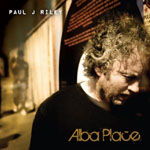|
|
|
PAUL J RILEY Alba Place Wurly Music WU2203(2012)

Paul J Riley's 'Alba Place' is a well crafted album, full of heartfelt relationship songs that strive for meaning and understanding on the back of lingering melodies and detailed musical minutiae that makes each track a consummate delight.
Given Paul's diverse background in design work and building, it's tempting to say that he's brought some of his guiding principals to bear on this project, especially given his apparent ability to build a song from the ground up and imbue it with rich meaning and melodic detail. When you add lashings of intuitive slide playing from Chris Eaton, some trademark harp from Mark Feltham - as on the opening 'Velvet'- and the judicious use of bv's as part of a delicately layered sound with a consistently crisp sonic quality, you have the basis of a delightful album.
'Alba Place' could easily have been recorded with just Paul's vocal and an acoustic guitar, but unlike so many other albums the layered music actually enhances the different moods and elements and gives greater emphasis to PJ's delicate vocals. Some of the songs are slow burners that reveal themselves more fully with repeated plays.
'Blue' for example, is ostensibly a song about a broken relationship and Paul dips into a lyrical painter's palate mode for inspiration; 'If I could live it all again one thing I'd do, I'd live my life in full colour next you', and he adds, 'I dream you in full colour on a green pathway, The only blue is the colour of the water in the bay'. He explores an understated languid feel, with a dreamy guitar figure and tinkling percussion that couches his whispered vocals in a strong melodic finish, at odds with his pessimistic lyrics; 'There is nothing left, there is nothing left of you and me.'
And if 'Blue' epitomises the overall feel of the album, 'I Have No Doubt' further explores his fragile feelings, but has more of gentle Edwyn Collins poppy feel with a radio friendly, uplifting chorus that fits perfectly with the contemporary singer-song writer environment.
If there's a slight draw back it's simply that too many of the songs share the same mid- tempo feel and thematically linked introspective lyrics. But this is balanced out by songs such as 'Portobello Sunrise' on which the rich melodic sweep and shimmering tones (guitar, organ, piano and choral bv's) gives the number extra depth.
Such is the flow of 'Alba Place' that each song feels like an integral part of a bigger canvas. The intrinsic interrelationships between each song acts like a chapters in a short story. Words and music blend into a seamless articulation as Paul's vocals hover over the top of a dozen songs that occasionally offer a strong hook and often evoke the wistful yearning of his lyrics. This is especially so on the catchy 'So Glad', while a strong arrangement evokes the author's loneliness on 'Time You Found Me'
Producer Wayne Proctor - who doubles on acoustic guitar and percussion - accentuates the instrumental flourishes and focuses on Riley's best melodic moments which frequently seduce the listener. Steve Wright's mix is warm and his mastering is clean and concise enough to capture a true sonic delight.
The bright production enhances the impressive harmony singing and delicate tinkling percussion. It also makes clever use of a tiny but dynamic pregnant pause on 'Monsters', transforming Paul's whispered vocal into something with real presence. 'The Ghost of You' could easily have been recorded in simple acoustic guitar and vocal format, but is transformed into a slowly evolving, subtly paced ballad full of textured slide guitar, organ, piano and an expressive vocal that fleetingly echoes Al Stewart.
'After Rain' follows and given it was the first track written for the project it effectively anchors the album in terms of its bristling arrangement, rich harmony singing and a strong melody that provides the sequencing with a much needed lift.
'Alba Place' finishes with 'Power Is Nothing', a chanted mantra on which the Paul tests the dynamics and commitment of a relationship. It's the concluding piece of a complex jig saw puzzle which traces the author's slowly unravelling delicate ego. Much like an unspoken influence Leonard Cohen, this is an album for lovers, a rallying call for broken hearts and souls in search of others, but it's also music that smoulders with enough optimism to suggest a brighter future. And after all, the core message is right there in the lyrics of 'After Rain'; 'Baby, don't you know, That the sweetest flowers grow after the rain'.
*****
Review by Pete Feenstra
 |
Print this page in printer-friendly format |
|
|
|
***** Out of this world | **** Pretty
damn fine |
*** OK, approach with caution unless you are a fan |
** Instant bargain bin fodder | * Ugly. Just ugly |
|
get ready to rock is a division of hotdigitsnewmedia group |
|
|

